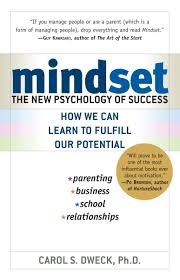
An excellent book which I enjoyed reading and highly recommend is Mindset by Carol Dweck.
According to Dweck, mindset is the view of the world that you adopt for yourself. Dweck’s work suggests that while we have fixed abilities programmed into our genes and via our early development, experience, training and effort take people from what is possible to what is real. The way we engage with our abilities is often the mediator of how successful we will be. The work on neuroplasticisty of the brain is now suggesting that we can impact our basic programming and influence our psychology at a level we previously believed was fixed. Dweck’s work suggests that the mindset we choose to adopt profoundly affects the way we lead our lives.
She notes there are two basic and distinct mindsets – a fixed mindset and a growth mindset.
Mindsets
A fixed mindset views our abilities as something carved in stone – that can’t be changed.
A growth mindset views our abilities as something you can cultivate through your efforts, experience and application.
People who adopt a fixed mindset believe that they only have a certain amount of intelligence, a certain personality, and a fixed moral character. This seems to then trigger a preservation and protection instinct – where a person feels an urgency to prove themselves over and over, to be concerned about looking as smart as possible, a fear of failure and of being exposed. They take the view that nothing ventured nothing lost, if at first you don’t success they you probably didn’t have the ability, If Rome wasn’t built in a day it probably wasn’t meant toPeople who adopt a growth mindset believe that while people may differ in the cards that they are initially dealt, everyone can change and grow. They do not necessarily believe they will be Einstein or Mozart but they do believe that their potential is unknowable. Deficiencies are not something to be hidden, they are something to be overcome. Experiences are not something to confirm what you already know but an opportunity to stretch yourself. A challenge is not a threat but an opportunity for challenge. They take the view that nothing ventured nothing gained, if at first you don’t succeed try again and Rome wasn’t built in a day.
People with a growth mindset put in more effort and they persist longer. They believe the following.
- success is about not about proving you are smart but it is about learning and stretching and challenging to make you smarter.
- Learning is a priority not finding out what you are good at.
- Faults and limitations are not something to hide from but something to explore and find out more about so that they can work on them more effectively.
- A ‘sure thing’ is not particularly interesting. Instead seek challenge and thrive on it.
- You are smartest when you are learning not when they produce flawless results or are getting things right.
- It’s not important to prove you are special, superior or entitled.
- Failure is something that is unpleasant and painful, but it is a problem that can be faced, dealt with and learned from.
- Achievement through effort is more rewarding, heroic and interesting to them than effortless perfection.
- Do not ‘die wondering’. If they you something you put in the effort to achieve it.
A great read. I’ll summarise some other ideas from the book in subsequent blogs.






